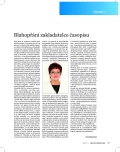Family system and caretakers‘ burdens with Alzheimer’s disease.
Authors:
E. Jarolímová; E. Broučková; I. Holmerová
Published in:
Geriatrie a Gerontologie 2016, 5, č. 3: 128-131
Category:
Original Article/Study
Overview
Because of the restraint of one’s ability of leading an independent life, Alzheimer’s dementia has a radical impact on those suffering from it and those around them. This dependency on others affects not only the caring-providing relatives but it also affects other family members. In the qualitative study we observed the effects of care burden on the family system, how it changes relationships in the family and how the care burden and duties are divided among the family members. Based on extensive semi-structured interviews we provide a description of relationships and conflicts in the family system appearing over the course of looking after a person with dementia. We’ve approached the topic from the family carer’s point of view, our respondents have had a direct, actual and long-term experience with the care at home. The main topics of the family care seemed to be: a voluntary autonomy, a shared care and sibling relationships. Family carers need supportive programs and psychosocial intervention including the long-term monitoring in order to support the family care about persons with dementia for as long time as possible.
KEYWORDS:
dementia – caregiver burden – models of family care – psychosocial intervention
Sources
1. Martin M, López RR, Núñez PA, et al. Anxiety and Depression in Caregivers of Alzheimer patients in the Dominican Republic. Associação Neurologia Cognitiva e do Comportamento Dementia & Neuropsychologia 2014; 8 : 384–388.
2. Mausbach B, Patterson T, Rabinowitz Y, et al. Depression and distress predict time to cardiovascular disease in dementia caregivers. Health Psychology 2007; 26 : 539–544.
3. Schindler M, Engel S, Rupprecht R. The impact of perceived knowledge of dementia on caregiver burden. The Journal of Gerontopsychology and Geriatric Psychiatry 2012; 25 : 127–134. [Dostupné též z databáze PsycARTICLES, cit. 2012-03-25].
4. Yalom I, Leszcz M. Specializované terapeutické skupiny. In: Yalom, I., Leszcz, M. Teorie a praxe skupinové psychoterapie. Praha: Portál 2007; 463–512.
5. Jarolímová E. Pečovatelská zátěž u Alzheimerovy choroby a její souvislosti. Disertační práce. Praha: FF UK 2016.
6. Gaugler JE, Zarit SH, Pearlin LI. The onset of dementia caregiving and its longitudinal implications. Psychology And Aging 2003; 18(2): 171–180.
7. Jeřábek H, Osuský M, Bartoňová J, et al. Rodinná péče o staré lidi. Praha: CESES FSV UK 2005.
8. Berger G, Bernhardt T, Weimer F, et al. Longitudinal Study on the Relationship Between Symptomatology of Dementia and Levels of Subjective Burden and Depression Among Family Caregivers in Memory Clinic Patients. Journal of Geriatric Psychiatry and Neurology 2005; 18(3): 119–128.
9. Milward C. Caring for Elderly Parents. Family Matters 1999; (52): 26–30.
10. Weirich SL. Case-Management für Menschen mit Demenz und ihre versorgenden Angehörigen. San Juan: Alzheimer Disease International Symposium 2014.
11. Franke L. Demenz in der Ehe. Über die verwirrende Gleichzeitigkeit von Ehe - und Pflegebeziehung. Frankfurt/M: Mabuse-Verlag 2006.
Labels
Geriatrics General practitioner for adults Orthopaedic prostheticsArticle was published in
Geriatrics and Gerontology

2016 Issue 3
- Advances in the Treatment of Myasthenia Gravis on the Horizon
- Memantine in Dementia Therapy – Current Findings and Possible Future Applications
- Memantine Eases Daily Life for Patients and Caregivers
- Possibilities of Using Metamizole in the Treatment of Acute Primary Headaches
- Hope Awakens with Early Diagnosis of Parkinson's Disease Based on Skin Odor
-
All articles in this issue
- The institute of formerly expressed wishes in Czech healthcare
- Statistics and predictions regarding care allowance for seniors with diabetes under new legislation.
- Physical restraints: the principles and standards for their use.
- A meeting in Brussels on the topic of palliative and long term care
- A health/social care round table discussion
- Nutritional care for people with dementia from the perspective of the Vážka® certification system.
- Improper procedure in use of restraining measures at a long term care facility
- The mystique of death
- Experience with evaluating self-sufficiency: the views of frail seniors and their care-givers.
- Nutritional screening carried out by nurses in retriement homes.
- Family system and caretakers‘ burdens with Alzheimer’s disease.
- Development of and experience with the cognitive training kit.
- Life on the edge. Coordination of care for patients with dementia at a special regimen facility.
- Integrated care: starting points and theoretical limitations of the koncept.
- Geriatrics and Gerontology
- Journal archive
- Current issue
- About the journal
Most read in this issue
- Physical restraints: the principles and standards for their use.
- Nutritional screening carried out by nurses in retriement homes.
- Integrated care: starting points and theoretical limitations of the koncept.
- The institute of formerly expressed wishes in Czech healthcare
